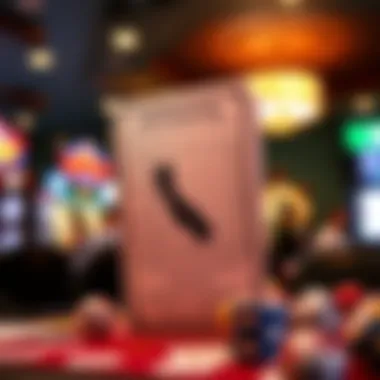Exploring the California Lottery Powerball Game


Intro
The California Lottery Powerball stands as a beacon for countless hopeful participants, offering not just the allure of vast winnings, but also a deep-rooted piece of amusement for many Californians and beyond. Since its inception, this lottery game has morphed from a simple chance game into a complex interplay of strategy, odds, and public engagement.
Understanding the intricacies of the Powerball requires delving into its history, exploring how the game operates, and analyzing the broader implications of lottery participation. With every ticket sold, there are stories of dreams, hope, and yes, the occasional disappointment. This article seeks to demystify the Powerball, offering insights into its mechanics and the social dynamics at play.
As we embark on this journey, I will discuss how the game is structured, the potential approaches for players, and importantly, the social impact it has on communities. From the average player filling out a slip to the cautious strategist trying to maximize their chances, there's a wealth of knowledge to uncover. Let's get started and explore the fascinating world of California's own Powerball!
The Origins of Powerball in California
The California Lottery Powerball stands as a remarkable testament to how a game not only thrives within its own framework but also resonates profoundly with the principles of community, chance, and the spirit of fair play. Understanding the origins of Powerball in California is crucial for potential players and enthusiasts alike. It unveils the foundational elements that contribute to its current popularity while highlighting the benefits and considerations surrounding such a lottery game.
Historical Background
The historical journey of the California Lottery Powerball began in 1985 with the establishment of the California State Lottery. Initially, the lottery aimed to provide additional funding to public education and community projects. This was similar to its counterparts across the United States, where lotteries were formed with the motive of generating revenue for these vital sectors. Powerball, a multi-state lottery game, was first launched in 1992, although California only joined the game in April 2013.
The introduction of Powerball in California was no small feat. The game features a unique structure, allowing players not just within the state but across multiple states to participate, leading to increasingly higher jackpots. Over the years, jackpots have soared into the hundreds of millions, captivating a vast audience eager for their shot at a life-changing win. This was accelerated by the blend of excitement and anticipation that accompanies every drawing.
Powerball’s expansive growth speaks volumes about its integration into Californian society. As more residents began to see their friends and family win large prizes, the allure of taking part in such a thrilling venture became nearly irresistible.
The Evolution of Lottery Games
As society has evolved, the landscape of lottery games—or games of chance, as some may refer to them—has transformed significantly. Early lotteries often relied on basic ticket sales and straightforward draws. However, Powerball represents a leap into modernizaion, bringing with it complexities and structures that engage players at a deeper level.
Initially, the concept of a regional lottery was limited, primarily involving local participants. With the emergence of online ticket sales and cross-state collaboration, Powerball paved the way for what's now an expansive market. Today, one can easily purchase tickets online or via various retailers, increasing accessibility, which in turn has broadened the player base tremendously.
In addition, Powerball frequently updates its formats—adding options like the Power Play, which allows players to multiply non-jackpot prizes. These adaptations keep the game suitable for new players while still engaging seasoned gamblers. Such evolutions signal not just growth, but a keen awareness of player interests and motivations.
“The Powerball journey in California embodies the balance between gambling excitement and community investment.”
The California Lottery Powerball, therefore, is not merely a game but a community instrument that reflects societal dynamics while providing entertainment and funding for public projects. Understanding its origins allows potential players to appreciate their experience beyond the ticket price, viewing it as part of a larger tapestry woven with dreams and aspirations.
How Powerball Works
Understanding how Powerball operates is crucial for anyone who intends to engage in this widely popular lottery game. Unlike many traditional lottery games where everything hinges on pure chance, Powerball incorporates elements that allow players to ponder strategies, enhance their chances, and make informed decisions. The mechanics of how the game runs and the ticket purchasing process lay the groundwork for players to navigate this landscape effectively and responsibly. Getting familiar with these aspects helps demystify the whole enterprise and equips players with the knowledge they need to approach their lottery experience wisely.
Mechanics of the Game
Powerball is essentially a draw game, meaning players choose a set of numbers that they believe will be drawn in the upcoming lottery draw. Each ticket includes five white balls and one red Powerball. The white balls are drawn from a drum containing 69 balls, while the Powerball is drawn from a separate drum of 26 balls. If you happen to match all the numbers drawn, that’s the jackpot, and players wind up in a life-altering situation.
The rules can seem straightforward, but there’s more beneath the surface:
- Winning Tiers: Besides the grand prize, players can win various smaller prizes by matching fewer numbers. The more numbers you match, the higher the reward. It's worth mentioning this multiple-tier structure increases the chances of winning significant sums, even if it isn't the jackpot.
- Multiplier Options: Players have an option to add a multiplier called Power Play, which can increase non-jackpot prizes by a factor of 2, 3, 4, 5, or even 10, depending on the draw. This add-on provides a strategic edge for those who want a little more bang for their buck.
Remember that Powerball draws occur twice a week, on Wednesdays and Saturdays, adding a layer of excitement to your Wednesday night and weekend rituals.
Ticket Purchase Process
The process of purchasing Powerball tickets can vary, but generally speaking, it is designed to be user-friendly.
- Where to Buy: Tickets can be purchased at authorized retailers across California or online for those opting for a digital avenue. The availability of online ticket sales has become a game-changer for many potential players who prefer convenience.
- How to Select Numbers: Players can either opt for a manual selection of their lucky numbers or choose the Quick Pick option, allowing the system to generate random numbers. There’s a case to be made for both methods. Many players have their cherished numbers tied to meaningful dates or experiences, which can add a personal touch to the game.
- Cost of a Ticket: A single Powerball ticket costs two dollars. However, if players choose the Power Play option, it adds an additional dollar to the price. This modest fee allows for the potential of significantly higher winnings, making players weigh their choices before making a purchase.
- Age Restrictions: It’s crucial to note that in California, one must be at least 18 years old to purchase a lottery ticket. This helps maintain a responsible gambling environment.
- Claiming Prizes: If by chance your ticket turns out to be a winner, the process of claiming the prize is worth understanding. Smaller prizes can be collected at retailers, while larger ones may require a visit to a lottery office. Knowing the various options and processes allows winners to comfortably claim their rewards without unnecessary stress.
Understanding Powerball Odds
Understanding the odds associated with California’s Powerball lottery is critical for anyone who plans to partake in the game. It is not merely about the thrill of winning but about playing wisely and making informed decisions. Grasping the odds equips players with the know-how to align their expectations, potentially enhancing their experience. This knowledge can mean the difference between chasing an elusive jackpot and simply enjoying the game.
By diving into the mechanics behind the odds, participants can grasp how likely they are to win various prizes, from the dreamy jackpots down to the smaller rewards. Knowing the odds also aids in creating strategies tailored to one’s risk tolerance and gaming style. This section touches on the fundamental aspects that comprise understanding Powerball odds, serving as a stepping stone for more thoughtful play.


Calculating the Chances
When it comes to calculating the odds in Powerball, one often comes across phrases like "1 in 292.2 million" for winning the jackpot. But what does this really mean? The odds are derived from the game’s format, which involves choosing five numbers from a pool of 69 and one Powerball number from a separate set of 26. The combination of these numbers creates a vast array of possible outcomes, making it imperative to understand the chances at play.
In essence, players should be aware that it is nearly impossible to predict the outcomes due to the sheer number of combinations. However, here’s a breakdown of the odds:
- Jackpot (5 + Powerball): 1 in 292.2 million
- Second Prize (5): 1 in 11.7 million
- Third Prize (4 + Powerball): 1 in 913,129
- Smaller Prizes (varying combinations): The odds improve as you look toward matches involving fewer numbers.
Understanding these numbers enables players to assess their risk and align their betting behavior to match their comfort level.
Jackpot Distribution
Jackpot distribution in Powerball is as thrilling as it sounds. But how the funds are allocated is intricate and rooted in regulations. When a jackpot is won, the prize may be taken as a lump sum or as an annuity payment over a number of years. When won, the prize pool is distributed as follows:
- Annuitized Payment: Spread across 30 years, increasing annually, offering winners a bit more each year.
- Lump Sum Option: A one-time cash payment that is considerably less than the advertised jackpot due to taxation.
It’s worth noting that state laws influence how much of the jackpot is retained. Taxes on winnings, for instance, can significantly diminish the amount the winner ultimately takes home. Winners often might be caught off guard by these taxes, so being informed is crucial.
Additionally, some of the jackpot money feeds back into state programs—funding education, infrastructure, or community projects, to name a few. This societal contribution adds a deeper layer of significance to participating in the game, transforming personal stakes into a collective investment.
As you digest this, keep in mind the role that odds play, not just in the thrill of winning, but in the implications of how such wins resonate throughout California. These factors are critical as one prepares to engage with the California Powerball.
Strategies for Playing Powerball
Understanding the nuances of Powerball can be as significant as the numbers on the ticket itself. Many enthusiastic players often jump into the game with wild hopes, unaware of how strategic choices can alter their experience and results. Approaching Powerball with a well-thought-out strategy not only heightens the enjoyment but can also enhance the likelihood of a successful outcome. Therefore, it's essential to build a strategy that encompasses selecting numbers wisely and considering the benefits of pooling resources.
Choosing Your Numbers
The art of selecting numbers goes beyond mere luck; it taps into patterns, intuition, and even some basic arithmetic. While some folks may toss a coin or go with a favorite number, others prefer a more calculated approach. Here are several methods that players often consider:
- Significant Dates: Many players tend to choose birthdays, anniversaries, or other significant dates. While heartfelt, it's worth noting that this method limits numbers to 1 through 31, potentially leaving some high-value numbers untouched.
- Random Selection: Those who lean toward the unpredictable may opt for random number generators. The randomness cuts out any attachment to numbers, making it an exciting option for some players.
- Pattern Formations: Some players find success by creating patterns on the ticket, whether squares or lines, believing that visual cues help manifest luck. While this method is more psychological, it can bolster a sense of involvement.
- Previous Draws Analysis: Reviewing the recent winning combinations might lend insight into what numbers are ‘due’ or frequently drawn. This analytical approach can feel methodical and offers a sense of control over the randomness of the game.
In Powerball, the only losin' ticket is the one you don't buy. The choice of numbers may seem trivial, but thinking through it adds more fun.
Pooling Resources with Others
One of the most collaborative strategies out there is creating a lottery pool, where players join forces and share the costs of tickets. Here’s why this can be constructive:
- Increased Chances: Buying more tickets collectively enhances the odds of winning, albeit the winnings will be split among the group. Having that shared ticket allows for a sense of community among players.
- Lowering Individual Costs: Pooling resources means less financial strain on each individual. It allows entry into the game without feeling the pinch of purchasing numerous tickets alone.
- Social Aspect: Participating in a pool can turn the act of playing into a communal event, fostering friendships and engaging conversations over strategies and potential winnings.
Of course, there are also some considerations to keep in mind:
- Trust Issues: It’s crucial to ensure that all members are trustworthy since winnings will be shared. Clear agreements should outline how winnings will be divided beforehand.
- Ticket Distribution: Having a plan for ticket pick-up and safekeeping can prevent misunderstandings about who has the winning numbers.
The journey of playing Powerball should be enjoyable, filled with anticipation and excitement. Thoughtful strategies in this game might lead not just to fat winnings but also richer experiences. In the world where luck meets strategy, every click or number choice matters.
The Role of Technology in Lottery
The intersection of technology and lottery games has revolutionized the way players engage with games like Powerball. No longer confined to paper tickets and physical draw events, modern advancements have not only simplified how we play but also enhanced the entire experience. This section will explore two key aspects—online ticket purchasing and result tracking applications—and how they contribute to the larger landscape of lottery participation in California.
Online Ticket Purchasing
Buying a Powerball ticket used to mean a trip to a local convenience store or market. However, with the rise of online ticket purchasing, players can now easily access the lottery from the comfort of their own home. This shift is not just about convenience; it also fosters a more inclusive environment for people who might be hesitant to partake physically, whether due to mobility issues, time constraints, or personal preferences.
With online platforms, users can navigate through different options to select numbers and purchase tickets in a straightforward manner. Transactions are often secure, incorporating various payment methods including credit cards and e-wallets, making it easier to interact with the lottery.
Some online platforms provide helpful features, such as:


- Auto-pick Options: For those unsure about which numbers to choose, auto-pick can generate random selections, adding an element of spontaneity.
- Subscription Services: Players can sign up for recurring tickets that automatically enter them in every draw, ensuring they never miss a chance to win.
Moreover, online ticket purchasing often comes with promotional offers and bonuses, captivating a wider audience to engage more actively with Powerball. However, it is essential to engage in responsible gambling practices when participating online to safeguard against excessive spending.
Result Tracking Applications
Once tickets are purchased, players may wonder about the best way to track results efficiently and accurately. Result tracking applications present a fantastic solution for keen players who want to stay updated without the hassle of traditional methods. These apps serve as a central hub for real-time draw results, statistics, and more.
Many applications go beyond just tracking winning numbers. They can provide insight into:
- Historical Data: Players can analyze past results, helping them identify trends or patterns, if any, regarding certain numbers.
- Prize Breakdown: These apps often clarify how prizes are distributed for various matches, which aids players in understanding their earning potential.
- Push Notifications: With settings customized according to personal preferences, users can receive instant notifications post-draw, ensuring they never miss important updates.
"Technology has completely changed the game, giving players tools to make informed choices and enhancing their overall experience."
Having access to these applications can significantly influence a player’s strategy, making it easier for them to participate in Powerball while remaining informed about their chances. However, players should always cross-reference app results with official lottery announcements to prevent any misinformation.
Responsible Gambling Practices
Engaging with lottery games like Powerball can be thrilling, but it’s crucial to approach it with a sound mindset. Responsible gambling practices are not just buzzwords; they are vital considerations that can shape one’s gambling experience. The essence of these practices is to ensure that players maintain control and enjoy gaming without letting it spiral into an unmanageable habit.
Understanding responsible gambling practices means acknowledging the delicate balance between fun and financial risk. It emphasizes the importance of setting boundaries, being aware of one's behavior, and recognizing when things may be crossing a line. Implementing these practices can lead to a more enjoyable experience, minimizing regrets down the road.
Setting Limits
To engage mindfully in Powerball, setting personal limits can be a powerful tool. These limits might include:
- Budgeting: Decide how much money you can afford to spend on Powerball tickets without it impacting your essential expenses. Allocate a specific amount each week or month strictly for lottery play.
- Frequency of Play: Determine how often you will play. Limiting yourself to certain days or drawing events can help manage your enthusiasm and spending.
- Ticket Quantity: Steer clear of buying more tickets than you initially planned. It may be tempting to purchase numerous tickets for a drawing, but sticking to a set number helps in keeping the budget in check.
"The key to enjoying Powerball is moderation. Like any entertainment, too much can lead to trouble."
Being diligent about these limits greatly helps in curtailing impulsive betting behavior. This way, the game remains a source of excitement rather than stress.
Recognizing Problem Gambling
Another critical aspect of responsible gambling is being able to recognize the signs of problem gambling. Not everyone who plays Powerball will run into issues, but it’s essential to know what to look for. Symptoms may include:
- Increasing Spending: If you find yourself straying from your budget or purchasing more tickets than initially planned, this might be a red flag.
- Chasing Losses: This behavior refers to the compulsion to continue playing or betting in hopes of recovering lost money. It's a slippery slope that can lead to greater financial challenges.
- Emotional Connection: If playing Powerball begins to impact your emotional state – maybe it brings anxiety or distress – it's time to reassess your relationship with the game.
Being aware of these tendencies is a crucial step towards ensuring that your gameplay remains a positive endeavor. Resources such as counseling services and online forums like reddit.com can be invaluable in providing support for those navigating through gambling challenges.
Ultimately, committing to responsible gambling practices is about being informed and proactive. It’s about keeping things in perspective and enjoying the possible highs while understanding the inherent risks. By adopting these practices, players can enhance their experience while contributing to a healthier gambling environment.
Impact of Powerball on California Society
The California Lottery, and specifically the Powerball game, plays a significant role in the social and economic fabric of the state. Understanding the implications of Powerball on society involves looking at both its financial contributions and its effect on community programs. This section explores how these dynamics create both benefits and considerations for residents, while providing critical insights into the broader impact lottery games have on community health and funding essential services.
Economic Contributions
The financial flows generated by Powerball and the wider California Lottery system are not just astounding; they are a lifeline for various community initiatives.
- Revenue Generation: Each ticket sold contributes to a sizable pot of revenue. In the fiscal year 2021, the California Lottery generated upwards of $6 billion, with a significant portion earmarked for education. This robust income forms a crucial aspect of the state budget.
- Job Creation: The lottery system stimulates job opportunities across the state, from retail outlets selling tickets to administrative roles within the lottery commission itself. As the game attracts players, it indirectly uplifts the local economy by ensuring employment in various sectors.
- Tax Contributions: The state reaps tax benefits as well, since a percentage of lottery sales is allocated to various state funds. These financial resources help support public services essential to California citizens.
Thus, the economic impact of Powerball transcends mere entertainment. It serves as a vital funding mechanism for public sectors, particularly education.
Community Programs Funded by Lottery
Beyond economic benefits, it’s crucial to spotlight the community programs supported by funds from the Powerball and other lottery games. The allocation of funds contributes to several vital sectors:


- Educational Initiatives: A noteworthy chunk of lottery revenue goes into education. Schools across California receive billions in funding that positively affects everything from classroom materials to scholarships for students. This funding often fills gaps left by insufficient state budgets.
- Public Health Programs: Some lottery funds are directed toward mental health initiatives and substance abuse prevention programs, key in supporting community well-being. These initiatives help people in distress by providing necessary resources and care.
- Parks and Recreation Funding: A percentage of the funds also supports local parks, recreational facilities, and community spaces. This creates opportunities for physical activity and community engagement that many families rely on.
"The impact of lottery funding on local schools is incredibly profound, often affecting thousands of students across the state, providing not just resources but opportunities for a brighter future."
While it’s easy to view Powerball merely as a game of chance, stepping outside that lens reveals a significant societal dimension. The intertwining of economic contributions and community support provided by lottery funds illustrates how profoundly Powerball impacts California, creating both opportunities and responsibilities for its citizens.
Future of Powerball in California
The future trajectory of Powerball in California seems to hang in a delicate balance, shaped by an array of regulatory challenges, shifting player preferences, and evolving technologies. With the ever-changing landscape of gambling legislation, it's essential to take a closer look at what lies ahead for this popular lottery game.
Potential Changes in Regulations
Regulatory changes can have a significant influence on how Powerball operates. In California, lawmakers continuously reassess gaming laws to adapt to the changing social and financial landscapes. One area of focus is the introduction of online gambling, an avenue that has been gaining traction across the nation. As more states begin to embrace remote betting, California might be compelled to follow suit in some form. It's possible that online ticket sales could broaden accessibility, attracting a more diverse player base.
Changes could also pertain to prize structures and payout percentages, which might be revisited to keep pace with initiatives aimed at responsible gambling. How prizes are awarded, along with adjustments to how jackpot amounts are announced, may shift to provide a more transparent and enticing experience for players.
With the increasing popularity of mobile applications, regulations around their use for ticket purchases and results tracking will also need to evolve. A well-regulated approach could mean a rise in player engagement and trust in the system.
Trends in Gambling Behavior
Understanding how gambling behavior has changed is crucial in predicting the future of Powerball. Over the past few years, younger demographics have shown a growing inclination toward digital and interactive gambling experiences. This shift illustrates a keen desire for convenience and instant gratification, reflected in the rising popularity of mobile apps and online platforms.
Moreover, there's a notable trend toward social gambling. Players are more likely to join pool setups with friends or family, a shift that transforms Powerball into a collective community experience rather than a solitary one. This communal aspect may lead to increased participation as individuals seek the thrill of shared victories.
Additionally, this culture of sharing financial responsibility may pave the way for innovative promotional strategies by lottery organizers. Advertisements targeting this audience could emphasize community engagement, linking ticket buying to socializing and collaboration.
To sum up, as California navigates the ever-evolving gaming landscape and societal changes, the future of Powerball appears ripe with opportunities for enhancement. While regulatory adjustments will shape the official framework, shifts in gambling behavior will dictate how these potential changes are received by the public. Keeping an eye on these developments will be critical, not just for players but also for all stakeholders involved in the lottery industry.
Perspectives from Winners
The perspectives of winners offer a colorful lens through which we can view the intricacies of the California Lottery Powerball. People's experiences after winning impact not just their lives, but also the broader dialogue around gambling, luck, and wealth. Understanding these narratives is critical for potential players seeking insights before they take a plunge into the Powerball realm.
Life After Winning
Winning a jackpot is a life-altering event, and each winner's story unfolds uniquely. Some bask in their newfound wealth, while others face unforeseen challenges. One common thread among winners is the sudden attention they receive from family, friends, and even strangers. It can create friction in relationships; some might feel entitled to share in the wealth, leading to complex emotional dynamics.
Practical considerations also flood a winner's mind. Suddenly, financial systems and options that once seemed distant become immediate and pressing matters. Choosing how to handle winnings—whether to opt for a lump sum or annuity—can weigh heavily. The decision isn't merely about numbers; it's about planning a lifestyle that enhances one’s happiness without losing touch with reality. For instance, some winners have chosen to invest in businesses or properties, while others have taken a more conservative route, focusing on savings and prudent spending.
On the flip side, many winners express a sense of alienation post-win. The realization that many of their relationships were built on pre-wealth familiarity can be sobering. It's a double-edged sword: the thrill of financial freedom entwined with the worry of superficial connections.
Psychological Effects of Sudden Wealth
The psychological impact of suddenly hitting the jackpot can be profound and complex. A common initial response is euphoria mixed with disbelief. This emotional high, however, is often followed by a wave of anxiety. The pressures of managing vast sums of money can lead to stress—wondering how to invest wisely, whether to help family or friends, or even the anxiety of maintaining one’s lifestyle.
Here are a few key psychological effects winners might experience:
- Overwhelm: Suddenly dealing with financial advisors, tax obligations, and investment opportunities can feel like drinking from a firehose.
- Loss of Purpose: Many winners find themselves grappling with a loss of direction. Their lives previously tied closely to work or personal goals may feel aimless without those anchor points.
- Isolation: As mentioned, the shift in relationships can make even the most joyous moments feel lonely. Discovering who genuinely supports you becomes a small journey in itself.
“Being rich is not just about money—it’s about finding a new way to live and being careful not to lose yourself along the way.”
In summary, the stories and psychological journeys of Powerball winners are rich with lessons. It isn't just about a ticket worth millions; it links back to the human experience, spotlighting how wealth influences personal identity, relationships, and emotional stability. Their narratives, filled with ups and downs, serve as cautionary tales and inspire future players to tread carefully in the waters of chance and fortune.
Finale
In wrapping up the exploration of Powerball in California, it becomes evident that understanding this gambling avenue goes beyond merely purchasing a ticket. It illuminates a landscape governed by chance but underpinned by a rich history and socio-economic undertones. The core of this narrative lies in grasping the mechanics of how Powerball operates, alongside the statistics that shape a player’s experience. From the origins of the game to the implications of winnings, each facet offers insights essential not only for seasoned players but also for newcomers treading these waters.
Summarizing Key Points
Powerball stands as a prime example of how gambling has intertwined with daily California life. Key points covered include:
- Historical Context: The way Powerball emerged from earlier lottery games highlights its evolution into a major player in the gambling industry.
- Game Mechanics: An understanding of how the game functions allows players to approach it with greater awareness, enhancing their overall experience.
- Odds and Strategies: Knowing the odds equips players to make informed decisions, whether they opt for lucky number patterns or pooling tickets with friends.
- Social Impact: The lottery isn’t just a form of entertainment; it plays a significant role in funding community initiatives, stressing its economic relevance.
- Responsible Gambling: Awareness surrounding responsible play ensures that individuals can take part without falling prey to the pitfalls that can sometimes accompany gambling.
Final Thoughts on Responsible Gambling
Engaging with Powerball or any lottery should be a form of entertainment, not a potential financial burden. It’s vital for gamblers to balance their hopes of hitting the jackpot with the realities of chance. Establishing personal limits—both in time and money spent—can transform the gaming experience into a healthier pursuit. Recognizing signs of problematic gambling behavior early on stands as a true benefit for maintaining a positive relationship with the game.















